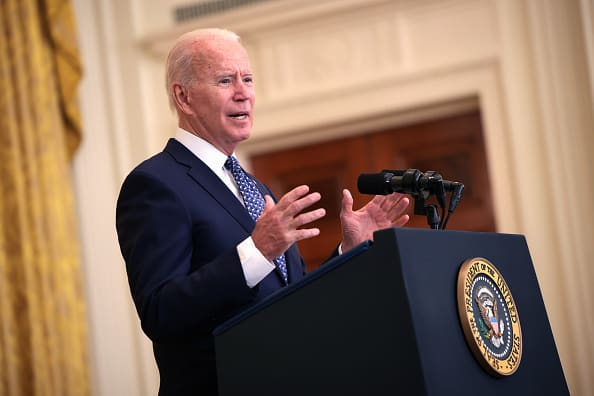
U.S. President Joe Biden talks about workers ’and unions’ rights in the East Room of the White House on September 8, 2021 in Washington, DC.
Kevin Dietsch | Getty Images
WASHINGTON – President Joe Biden announced the formation of a new security partnership between the United States, Australia and the United Kingdom that seeks to strengthen stability in the Indo-Pacific region as China expands its power and influence military.
Prime Ministers Scott Morrison of Australia and Boris Johnson of the United Kingdom virtually joined Biden in announcing the partnership.
“Today we take another historic step to deepen and formalize cooperation between the three nations so that we all recognize the imperative to ensure long-term peace and stability in the Indo-Pacific,” Biden said from the East Room. of the White House. “It’s about investing in our biggest source of strength, our alliances,” Biden said.
“This initiative seeks to ensure that each of us has the most modern capabilities we need to maneuver and defend ourselves from rapidly evolving threats,” the president said.
U.S. President Joe Biden attends a virtual press conference on national security with British Prime Minister Boris Johnson and Australian Prime Minister Scott Morrison in the East Room of the White House in Washington, DC, on September 15 of 2021.
Brendan Smialowski | AFP | Getty Images
The formation of the trio comes as the United States and the United Kingdom end their 20-year military involvement in Afghanistan, a decision Biden has said will allow the United States to focus on emerging threats from Russia and China. .
A senior Biden administration official, who spoke on condition of anonymity before the announcement, said the United States, Australia and the United Kingdom plan to deepen technology exchange in emerging security fields. such as cybernetics, artificial intelligence, and quantum technologies.
The United States and the United Kingdom will also help Canberra acquire nuclear-powered submarines, which will allow the Australian Navy to help counter Chinese ships in the region.
“This will give Australia the capacity for its submarines to be deployed basically for longer periods, they are quieter, they are much more capable, they will allow us to maintain and improve deterrence across the Indo-Pacific,” the official said.
“What we are seeing in the Indo-Pacific region is a set of circumstances in which capabilities are more advanced,” the official added. “This allows Australia to play at a much higher level and increase American capabilities.”
Biden’s approach to China
Chinese President Xi Jinping with a Naval Honor Guard.
Feng Li | Getty Images News | Getty Images
The administration official downplayed the idea that the new security association was trying to send a message specifically to China.
“I want to emphasize very clearly that this partnership is not aimed at any country, but is about promoting our strategic interests, maintaining order based on international standards and promoting peace and stability in Indochina. “Peaceful,” the official said.
Still, the announcement of the security association centered in the South Indian Pacific region comes when Biden tries to reshape the U.S. approach to the Chinese government in the wake of the Trump administration’s trade war and while the world continues to face the Covid pandemic, which originated in Wuhan, China.
Biden, who spoke with Chinese President Xi Jinping last week, previously said his approach to China would be different from his predecessor, as he would work more closely with allies in order to retreat against Beijing.
The Pentagon is also struggling to cope with the rapid expansion of the Chinese army.
Earlier this year, Secretary of Defense Lloyd Austin led the Pentagon to place China and its military accumulation at the center of U.S. defense policy.
“This directive from the secretary is ultimately about tidying up the department house and making sure the department meets China’s stated priority as the No. 1 pace challenge,” said a senior Defense official, who spoke with anonymity. in June.